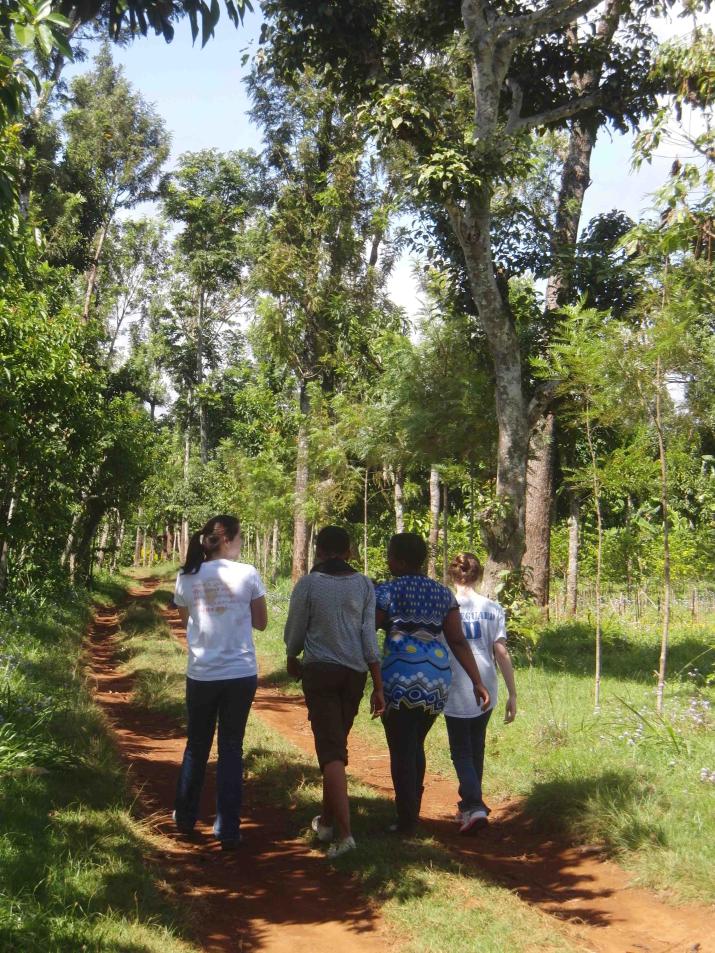
On the Road Again: Chandra, Brittany and friends explore the village next door. (Photograph courtesy of Rachael Clark)
Published June 22, 2013, last updated on October 5, 2017 under Voices of DGHI
By: Chandra Swanson
This blog post is from the week of June 10th - 15th. My apologies for the tardiness – we experienced some internet and technical difficulties in uploading the post.
Lately, elephants have been on my mind. I’ve accidently incorporated elephants into meal conversation for days in a row, until I finally learned that the word for stomach is in fact not “tembo”, but “tumbo”. The larger elephant in the room, though, concerns the true impact of our fieldwork project.
This elephant came into existence after one interview Tuesday morning. The two previous visits had gone off without a hitch, and sitting down to start number three, I was feeling quite confident. However, once we had gotten through the consent form, the interviewee suddenly hesitated, pushing her copy away. She quietly, but firmly, whispered something to our translator. Again, there was a moment of hesitation as the translator struggled to find a way to explain the problem. It turned out to be a simple sentence: every year, she saw people come and do surveys and ask questions, but then nothing ever changed.
There, then, was my own moment of hesitation. What could I say to convince the woman to participate? Was it even right to try? Though the community had begun their contribution by participating, our contribution is, as of yet, intangible. So, I shared our tentative plans to hold community presentations detailing our findings, and ultimately, gained her agreement.
While I don’t think she was directly upset by our project, I could understand her frustration. Here we are, three young, female wazungu, investing for eight weeks our time and energy to evaluate knowledge about HPV, alcohol and maternal health. But in eight weeks, even less now, we would be packing up and leaving. Most likely, the alcohol packet litter would remain. No doubt cervical cancer will still loom a huge threat.
Other experiences have since fed these unsettling seeds of doubt. First, my participants will often brighten up when they hear I am working with the dispensary, and eagerly ask my advice about achy knees or a persistent cough. I must constantly explain that “Mimi siyo daktari” – I am not a doctor. It’s hard, seeing their disappointment, when we re-explain that all I am really there to do is talk. Second, one of our German housemates shared a critique she heard from a Tanzanian co-worker – that as a well-off, well-educated white person who had never known hunger or empty pockets, she would never truly be able to understand, much less evaluate, this community. Once again, I had no ready reply.
Later, as I tried to sort out my thoughts, my mind turned to elephants. In particular, I remembered the fable “The Blind Men and the Elephant”. Here’s the gist: a group of blind men have come across a creature and are arguing about what they have found. Each has hold of a different part of the animal, and each believes the entirety of the object is within their grasp; they never explore beyond their arm span. As such, one believes they have found a wall, the second a tree, the third a rope, and the fourth a fan. It takes a sighted person to walk in and see the whole creature for what it is – an elephant.
Yes, this is at best a shaky metaphor – our community is not blind, stubborn, and narrow-minded, and we are not gifted with some better form of sight. But to me, it provides a bit of an answer to my doubts. Despite our limitations, I do believe a fresh perspective and an outside voice could find success where a local voice has become background chatter. It’s something we’ve found ourselves on a small scale as we refine our surveys. We had come to Mwika with pre-set questions based on our pre-set ideas and goals. But after discussing our aims with our host sisters, other foreign volunteers, and various leaders in the community, we accepted that some adjustments would be necessary. Having worked so closely on our project, we needed eyes that could see a larger picture.
I hope that once we complete our interviews, we will have gathered the bits and pieces – the wall, the tree, the rope, the fan. Call me an idealist, but I have high hopes that our good intentions and hard work will piece at least one complete elephant, something as solid and lasting as a tembo itself.


